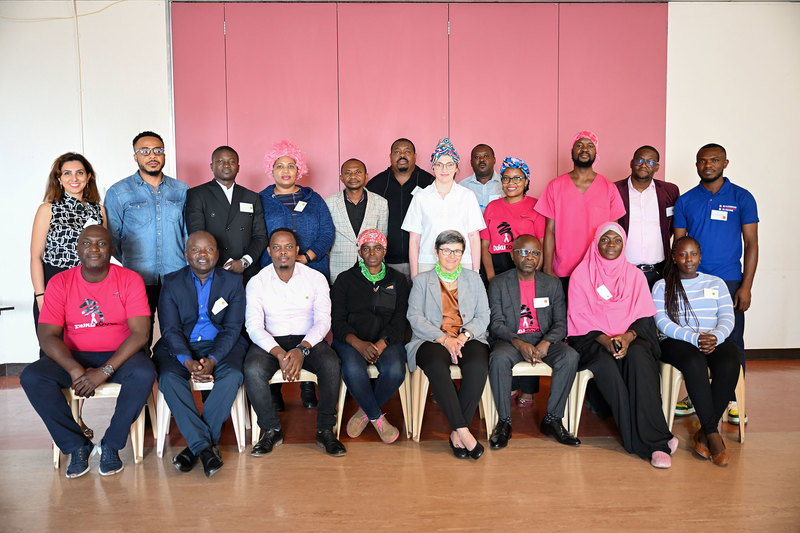Access to Care: Celebrating a decade of skills advancement for radiotherapy professionals
16 October 2024 | Story Tivania Moodley. Photos Lerato Maduna. Read time 6 min.
In commemoration of Breast Cancer Awareness Month, the Access to Care (A2C) Programme recently hosted a week-long training programme to equip healthcare professionals with advanced treatment planning techniques for clinical sites; breast, gynae and head and neck cancers.
Hosted at Groote Schuur Hospital’s radiotherapy department, teams from seven countries – six from Africa – also attended practical sessions on the clinical floor and linear accelerators to help them develop safe clinical protocols and quality assurance programmes in their respective departments.
Elaine Smith, a medical physicist and project coordinator for the A2C Cape Town Training Programme, said A2C is addressing the need for advanced training in radiation oncology; as well as the gap in radiotherapy education in low to middle income countries.
“Although radiotherapy education programmes are well established in the larger academic centres in South Africa, the same cannot be said of many smaller South African centres, as well as other sub-Saharan African countries. The A2C programme was created to address the need in these areas and provides training to a multi-disciplinary team: radiation oncologist, radiation therapist, and medical physicist,” she said.
This year the A2C is proudly celebrating 10 years of existence. Launched in 2015 in collaboration with Varian Education, the University of Cape Town (UCT) and the Cape Peninsula University of Technology, the programme has trained more than 80 radiotherapy treatment teams from various African countries, as well as teams from countries such as Pakistan, Yemen, and the United Arab Emirates. The first course focused on clinics moving from 2D to 3D conformal radiotherapy (3D CRT).
The training programme, established in 2014, has grown to offer six courses. It is designed to be an innovative technology-based teaching platform for the cancer treatment teams, focusing on the practical skills required for qualified radiotherapy professionals to safely move to more advanced techniques.
“The training model is based on eLearning, didactic lectures, alternative platform teaching, hands-on planning, practical demos and continued mentorship. Thirteen teams from Africa attended the course between 2015 and 2019, with additional participants from seven South African and four international centres. At the end of the programme, each participant will gain a good understanding of tools, processes and tasks which are necessary to successfully apply advanced treatment techniques,” said Smith.
Supporting breast cancer awareness
The recent training session ended with a breast cancer event held at Klein Schuur. At the event, teams were asked to present their country’s cancer patient population and their efforts in building capacity for radiotherapy. They also spoke about cancer awareness campaigns in their countries. Most awareness campaigns offer free screening services to rural communities. It’s great to hear that screening initiatives are in place in multiple countries in Africa,” said Smith.
“The teams who attended the [recent] training in person were from [South Africa], Zambia, Botswana, Cameroon, Nigeria, Kenya, Uganda. Yemen could only attend remotely. All the travel and accommodation were sponsored, after applying for an Education Grant.”
Africa’s cancer challenges
Radiotherapy is a highly technological and fast-changing field – and with change comes the need for ongoing education. Radiotherapy education, however, is often not aligned with the specific challenges faced by low- to middle-income countries. A2C is trying to address those challenges by supplementing practical radiotherapy training on the African continent and thus increasing skills of clinical radiotherapy staff.
Cancer mortality rates in Africa are substantially higher than those of the rest of the world. The World Health Organization (WHO) reports that by 2030 there will be some 1.6 million new cancer cases in Africa each year, resulting in 1.2 million deaths.
The role of radiotherapy in cancer care is clearly established, with a correlation between access to radiotherapy and overall survival. The contribution of radiotherapy to survival is estimated at around 40%.
“At the end of the programme, each participant will gain a good understanding of tools, processes and tasks which are necessary to successfully apply advanced treatment techniques,” said Smith.
Radiotherapy requires sophisticated treatment machines, as well as computerised treatment planning systems to plan the delivery of the radiation accurately. About half of all cancer patients will require radiotherapy, but access to the machines is often limited. Africa has always faced challenges in terms of cancer care, with lower numbers of oncology centres and treatment machines per person compared with other continents. There is no region in Africa with more than three megavoltage radiotherapy machines per million population and several countries have no access to radiotherapy at all.
Facilitating the move to modern radiotherapy techniques
The A2C training programme helps to facilitate the transition from basic radiotherapy techniques utilising 2D planning and Cobalt machines, to more modern techniques utilising 3D CRT. The increased conformity that is achievable with 3D CRT results in a more homogeneous dose delivery and a reduction in dose to critical organs at risk. The potential to improve local control, as well as toxicity is directly beneficial to patients.
With 3D CRT treatments, there is an increased need for accuracy in terms of dose and positioning to ensure effective cancer treatment. Training radiotherapy professionals to this end is crucial.
“We are in the process of renewing the training collaboration agreement to continue the programme for another five years. We also hope to adapt the programme to the evolving needs of the teams we train. We have already seen substantial growth in the knowledge and skills of radiotherapy professionals. A2C is gaining real momentum in training programmes and is creating even greater access to advanced cancer treatments in developing nations,” said Smith.
 This work is licensed under a Creative Commons Attribution-NoDerivatives 4.0 International License.
This work is licensed under a Creative Commons Attribution-NoDerivatives 4.0 International License.
Please view the republishing articles page for more information.

















